| Listing 1 - 7 of 7 |
Sort by
|
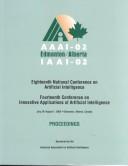
ISBN: 0262511290 Year: 2002 Publisher: [Place of publication not identified] MIT Press
Abstract | Keywords | Export | Availability | Bookmark
 Loading...
Loading...Choose an application
- Reference Manager
- EndNote
- RefWorks (Direct export to RefWorks)
681.3*I23 <063> --- 681.3*I24 <063> --- 681.3*I26 <063> --- 681.3*I27 <063> --- 681.3*D16 <063> --- 681.3*I2m --- Deduction and theorem proving: answer/reason extraction; reasoning; resolution; metatheory; mathematical induction; logic programming (Artificial intelligence)--Congressen --- Knowledge representation formalisms and methods: frames and scripts; predicate logic; relation systems; representation languages; procedural and rule-based representations; semantic networks (Artificial intelligence)--Congressen --- Learning: analogies; concept learning; induction; knowledge acquisition; language acquisition; parameter learning (Artificial intelligence)--See also {681.3*K32}--Congressen --- Natural language processing: language generation; language models; language parsing and understanding; machine translation; speech recognition and under-standing; text analysis (Artificial intelligence)--Congressen --- Programming techniques: Logic programming--Congressen --- Artificial intelligence. AI --- Information Technology --- Computer Science (Hardware & Networks) --- 681.3*I2m Artificial intelligence. AI --- 681.3*I26 <063> Learning: analogies; concept learning; induction; knowledge acquisition; language acquisition; parameter learning (Artificial intelligence)--See also {681.3*K32}--Congressen --- 681.3*I24 <063> Knowledge representation formalisms and methods: frames and scripts; predicate logic; relation systems; representation languages; procedural and rule-based representations; semantic networks (Artificial intelligence)--Congressen --- 681.3*I23 <063> Deduction and theorem proving: answer/reason extraction; reasoning; resolution; metatheory; mathematical induction; logic programming (Artificial intelligence)--Congressen
Book
ISBN: 3540859284 3540859276 Year: 2008 Publisher: Berlin ; Heidelberg ; New York : Springer,
Abstract | Keywords | Export | Availability | Bookmark
 Loading...
Loading...Choose an application
- Reference Manager
- EndNote
- RefWorks (Direct export to RefWorks)
This book constitutes the refereed proceedings of the 18th International Conference on Inductive Logic Programming, ILP 2008, held in Prague, Czech Republic, in September 2008. The 20 revised full papers presented together with the abstracts of 5 invited lectures were carefully reviewed and selected during two rounds of reviewing and improvement from 46 initial submissions. All current topics in inductive logic programming are covered, ranging from theoretical and methodological issues to advanced applications. The papers present original results in the first-order logic representation framework, explore novel logic induction frameworks, and address also new areas such as statistical relational learning, graph mining, or the semantic Web.
Logic programming --- Induction (Logic) --- Inductive logic --- Logic, Inductive --- Logic --- Reasoning --- Information Technology --- Artificial Intelligence --- 681.3*D16 <063> --- 681.3*I26 <063> --- 681.3*I23 <063> --- 681.3*I2 <063> --- 681.3*F41 <063> --- Computer programming --- 681.3*I26 <063> Learning: analogies; concept learning; induction; knowledge acquisition; language acquisition; parameter learning (Artificial intelligence)--See also {681.3*K32}--Congressen --- Learning: analogies; concept learning; induction; knowledge acquisition; language acquisition; parameter learning (Artificial intelligence)--See also {681.3*K32}--Congressen --- 681.3*I2 <063> Artificial intelligence. AI--Congressen --- Artificial intelligence. AI--Congressen --- 681.3*I23 <063> Deduction and theorem proving: answer/reason extraction; reasoning; resolution; metatheory; mathematical induction; logic programming (Artificial intelligence)--Congressen --- Deduction and theorem proving: answer/reason extraction; reasoning; resolution; metatheory; mathematical induction; logic programming (Artificial intelligence)--Congressen --- Computer science--?*D16 --- Mathematical logic: computability theory; computational logic; lambda calculus; logic programming; mechanical theorem proving; model theory; proof theory;recursive function theory--See also {681.3*F11}; {681.3*I22}; {681.3*I23}--Congressen --- Artificial intelligence. --- Computer science. --- Computer software. --- Data mining. --- Artificial Intelligence. --- Programming Techniques. --- Mathematical Logic and Formal Languages. --- Algorithm Analysis and Problem Complexity. --- Data Mining and Knowledge Discovery. --- Algorithmic knowledge discovery --- Factual data analysis --- KDD (Information retrieval) --- Knowledge discovery in data --- Knowledge discovery in databases --- Mining, Data --- Database searching --- Software, Computer --- Computer systems --- Informatics --- Science --- AI (Artificial intelligence) --- Artificial thinking --- Electronic brains --- Intellectronics --- Intelligence, Artificial --- Intelligent machines --- Machine intelligence --- Thinking, Artificial --- Bionics --- Cognitive science --- Digital computer simulation --- Electronic data processing --- Logic machines --- Machine theory --- Self-organizing systems --- Simulation methods --- Fifth generation computers --- Neural computers --- Computer programming. --- Mathematical logic. --- Algorithms. --- Algebra of logic --- Logic, Universal --- Mathematical logic --- Symbolic and mathematical logic --- Symbolic logic --- Mathematics --- Algebra, Abstract --- Metamathematics --- Set theory --- Syllogism --- Computers --- Electronic computer programming --- Electronic digital computers --- Programming (Electronic computers) --- Coding theory --- Algorism --- Algebra --- Arithmetic --- Programming --- Foundations
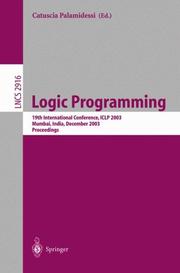
ISBN: 9783540206422 3540206426 9783540245995 9786610306565 1280306564 3540245995 Year: 2003 Publisher: Berlin, Heidelberg : Springer Berlin Heidelberg : Imprint: Springer,
Abstract | Keywords | Export | Availability | Bookmark
 Loading...
Loading...Choose an application
- Reference Manager
- EndNote
- RefWorks (Direct export to RefWorks)
This volume contains the proceedings of the 19th International Conference on Logic Programming, ICLP 2003, which was held at the Tata Institute of F- damental Research in Mumbai, India, during 9–13 December, 2003. ICLP 2003 was colocated with the 8th Asian Computing Science Conference, ASIAN 2003, andwasfollowedbythe23rdConferenceonFoundationsofSoftwareTechnology and Theoretical Computer Science, FSTTCS 2003. The latter event was hosted by the Indian Institute of Technology in Mumbai. In addition, there were ?ve satellite workshops associated with ICLP 2003: – PPSWR 2003, Principles and Practice of Semantic Web Reasoning, 8th Dec. 2003, organized by Fran¸ cois Bry, Nicola Henze, and Jan Maluszynski. – COLOPS 2003, COnstraint & LOgic Programming in Security, 8th Dec. 2003, organized by Martin Leucker, Justin Pearson, Fred Spiessens, and Frank D. Valencia. – WLPE 2003, Workshop on Logic Programming Environments, organized by Alexander Serebrenik and Fred Mesnard. – CICLOPS2003,ImplementationofConstraintandLOgicProgrammingS- tems, 14th Dec. 2003, organized by Michel Ferreira and Ricardo Lopes. – SVV 2003, Software Veri?cation and Validation, 14th Dec. 2003, organized by Sandro Etalle, Supratik Mukhopadhyay, and Abhik Roychoudhury.
Logic programming --- Programmation logique --- Congresses. --- Congrès --- Computer science. --- Logic design. --- Artificial intelligence. --- Computer Science. --- Programming Techniques. --- Programming Languages, Compilers, Interpreters. --- Logics and Meanings of Programs. --- Mathematical Logic and Formal Languages. --- Artificial Intelligence (incl. Robotics). --- 681.3*D16 <063> --- 681.3*I23 <063> --- 681.3*I24 <063> --- 681.3*D3 <063> --- 681.3*F3 --- 681.3*F4 --- Computer science--?*D16 --- Deduction and theorem proving: answer/reason extraction; reasoning; resolution; metatheory; mathematical induction; logic programming (Artificial intelligence)--Congressen --- Knowledge representation formalisms and methods: frames and scripts; predicate logic; relation systems; representation languages; procedural and rule-based representations; semantic networks (Artificial intelligence)--Congressen --- Programming languages--Congressen --- Logics and meanings of programs (Theory of computation) --- Mathematical logic and formal languages (Theory of computation) --- 681.3*F4 Mathematical logic and formal languages (Theory of computation) --- 681.3*F3 Logics and meanings of programs (Theory of computation) --- 681.3*D3 <063> Programming languages--Congressen --- 681.3*I24 <063> Knowledge representation formalisms and methods: frames and scripts; predicate logic; relation systems; representation languages; procedural and rule-based representations; semantic networks (Artificial intelligence)--Congressen --- 681.3*I23 <063> Deduction and theorem proving: answer/reason extraction; reasoning; resolution; metatheory; mathematical induction; logic programming (Artificial intelligence)--Congressen --- Software engineering. --- Computer programming. --- Programming languages (Electronic computers). --- Computer logic. --- Mathematical logic. --- Software Engineering/Programming and Operating Systems. --- AI (Artificial intelligence) --- Artificial thinking --- Electronic brains --- Intellectronics --- Intelligence, Artificial --- Intelligent machines --- Machine intelligence --- Thinking, Artificial --- Bionics --- Cognitive science --- Digital computer simulation --- Electronic data processing --- Logic machines --- Machine theory --- Self-organizing systems --- Simulation methods --- Fifth generation computers --- Neural computers --- Algebra of logic --- Logic, Universal --- Mathematical logic --- Symbolic and mathematical logic --- Symbolic logic --- Mathematics --- Algebra, Abstract --- Metamathematics --- Set theory --- Syllogism --- Computer science logic --- Logic, Symbolic and mathematical --- Computer languages --- Computer program languages --- Computer programming languages --- Machine language --- Languages, Artificial --- Computers --- Electronic computer programming --- Electronic digital computers --- Programming (Electronic computers) --- Coding theory --- Computer software engineering --- Engineering --- Informatics --- Science --- Programming --- Artificial Intelligence. --- Design, Logic --- Design of logic systems --- Digital electronics --- Electronic circuit design --- Logic circuits --- Switching theory
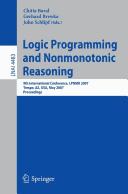
ISBN: 9783540721994 3540721991 9786610940721 1280940727 1280307978 3540722009 Year: 2007 Publisher: Berlin ; Heidelberg : Springer-Verlag,
Abstract | Keywords | Export | Availability | Bookmark
 Loading...
Loading...Choose an application
- Reference Manager
- EndNote
- RefWorks (Direct export to RefWorks)
Logic programming --- Nonmonotonic reasoning --- Programmation logique --- Raisonnement non-monotone --- Congresses. --- Congrès --- Logic programming -- Congresses. --- Nonmonotonic reasoning -- Congresses. --- Computer Science --- Mechanical Engineering - General --- Engineering & Applied Sciences --- Mechanical Engineering --- 681.3*I23 <063> --- 681.3*I24 <063> --- 681.3*I2 <063> --- 681.3*F41 <063> --- 681.3*D16 <063> --- Deduction and theorem proving: answer/reason extraction; reasoning; resolution; metatheory; mathematical induction; logic programming (Artificial intelligence)--Congressen --- Knowledge representation formalisms and methods: frames and scripts; predicate logic; relation systems; representation languages; procedural and rule-based representations; semantic networks (Artificial intelligence)--Congressen --- Artificial intelligence. AI--Congressen --- Mathematical logic: computability theory; computational logic; lambda calculus; logic programming; mechanical theorem proving; model theory; proof theory;recursive function theory--See also {681.3*F11}; {681.3*I22}; {681.3*I23}--Congressen --- Computer science--?*D16 --- Information Technology --- Artificial Intelligence --- 681.3*I2 <063> Artificial intelligence. AI--Congressen --- 681.3*I24 <063> Knowledge representation formalisms and methods: frames and scripts; predicate logic; relation systems; representation languages; procedural and rule-based representations; semantic networks (Artificial intelligence)--Congressen --- 681.3*I23 <063> Deduction and theorem proving: answer/reason extraction; reasoning; resolution; metatheory; mathematical induction; logic programming (Artificial intelligence)--Congressen --- Non-monotonic reasoning --- Computer science. --- Software engineering. --- Computer programming. --- Mathematical logic. --- Artificial intelligence. --- Computer Science. --- Software Engineering/Programming and Operating Systems. --- Artificial Intelligence (incl. Robotics). --- Mathematical Logic and Formal Languages. --- Programming Techniques. --- Reasoning --- AI (Artificial intelligence) --- Artificial thinking --- Electronic brains --- Intellectronics --- Intelligence, Artificial --- Intelligent machines --- Machine intelligence --- Thinking, Artificial --- Bionics --- Cognitive science --- Digital computer simulation --- Electronic data processing --- Logic machines --- Machine theory --- Self-organizing systems --- Simulation methods --- Fifth generation computers --- Neural computers --- Algebra of logic --- Logic, Universal --- Mathematical logic --- Symbolic and mathematical logic --- Symbolic logic --- Mathematics --- Algebra, Abstract --- Metamathematics --- Set theory --- Syllogism --- Computers --- Electronic computer programming --- Electronic digital computers --- Programming (Electronic computers) --- Coding theory --- Computer software engineering --- Engineering --- Informatics --- Science --- Programming --- Artificial Intelligence.
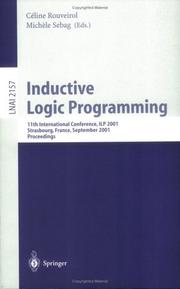
ISBN: 3540425381 3540447970 9783540425380 Year: 2001 Volume: 2157 Publisher: Berlin, Heidelberg : Springer Berlin Heidelberg : Imprint: Springer,
Abstract | Keywords | Export | Availability | Bookmark
 Loading...
Loading...Choose an application
- Reference Manager
- EndNote
- RefWorks (Direct export to RefWorks)
Logic programming --- 681.3*D16 <063> --- 681.3*I26 <063> --- 681.3*I23 <063> --- 681.3*F41 <063> --- 681.3*F22 <063> --- Computer programming --- Programming techniques: Logic programming--Congressen --- Learning: analogies; concept learning; induction; knowledge acquisition; language acquisition; parameter learning (Artificial intelligence)--See also {681.3*K32}--Congressen --- Deduction and theorem proving: answer/reason extraction; reasoning; resolution; metatheory; mathematical induction; logic programming (Artificial intelligence)--Congressen --- Mathematical logic: computability theory; computational logic; lambda calculus; logic programming; mechanical theorem proving; model theory; proof theory;recursive function theory--See also {681.3*F11}; {681.3*I22}; {681.3*I23}--Congressen --- Nonnumerical algorithms and problems: complexity of proof procedures; computations on discrete structures; geometrical problems and computations; pattern matching --See also {?681.3*E2-5}; {681.3*G2}; {?681.3*H2-3}--Congressen --- Computer Science --- Engineering & Applied Sciences --- 681.3*I23 <063> Deduction and theorem proving: answer/reason extraction; reasoning; resolution; metatheory; mathematical induction; logic programming (Artificial intelligence)--Congressen --- 681.3*I26 <063> Learning: analogies; concept learning; induction; knowledge acquisition; language acquisition; parameter learning (Artificial intelligence)--See also {681.3*K32}--Congressen --- Computer science. --- Architecture, Computer. --- Software engineering. --- Computer programming. --- Algorithms. --- Mathematical logic. --- Artificial intelligence. --- Computer Science. --- Computer System Implementation. --- Software Engineering/Programming and Operating Systems. --- Artificial Intelligence (incl. Robotics). --- Programming Techniques. --- Mathematical Logic and Formal Languages. --- Algorithm Analysis and Problem Complexity. --- AI (Artificial intelligence) --- Artificial thinking --- Electronic brains --- Intellectronics --- Intelligence, Artificial --- Intelligent machines --- Machine intelligence --- Thinking, Artificial --- Bionics --- Cognitive science --- Digital computer simulation --- Electronic data processing --- Logic machines --- Machine theory --- Self-organizing systems --- Simulation methods --- Fifth generation computers --- Neural computers --- Algebra of logic --- Logic, Universal --- Mathematical logic --- Symbolic and mathematical logic --- Symbolic logic --- Mathematics --- Algebra, Abstract --- Metamathematics --- Set theory --- Syllogism --- Algorism --- Algebra --- Arithmetic --- Computers --- Electronic computer programming --- Electronic digital computers --- Programming (Electronic computers) --- Coding theory --- Computer software engineering --- Engineering --- Architecture, Computer --- Informatics --- Science --- Foundations --- Programming --- Computer network architectures. --- Computer software. --- Artificial Intelligence. --- Software, Computer --- Computer systems --- Architectures, Computer network --- Network architectures, Computer --- Computer architecture --- Logic programming - Congresses
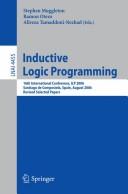
ISBN: 9783540738466 3540738460 3540738479 Year: 2007 Publisher: Berlin, Germany ; New York, United States : Springer,
Abstract | Keywords | Export | Availability | Bookmark
 Loading...
Loading...Choose an application
- Reference Manager
- EndNote
- RefWorks (Direct export to RefWorks)
The inherent dangers of change are often summed up in the misquoted Chinese curse “May you live in interesting times.” The submission procedure for the 16th International Conference of Inductive Logic Programming (ILP 2006) was a radical (hopefully interesting but not cursed) departure from previous years. Submissions were requested in two phases. The ?rst phase involved submission of short papers (three pages) which were then presented at the conference and included in a short papers proceedings. In the second phase, reviewers selected papersforlongpapersubmission(15pagesmaximum).Thesewerethenassessed by the same reviewers, who then decided which papers to include in the journal special issue and proceedings. In the ?rst phase there were a record 77 papers, comparedto the usual20 orso long papersofpreviousyears.Eachpaper was- viewed by three reviewers. Out of these, 71 contributors were invited to submit long papers. Out of the long paper submissions, 7 were selected for the - chine Learning Journal special issue and 27 were accepted for the proceedings. In addition, two papers were nominated by Program Committee referees for the applications prize and two for the theory prize. The papers represent the div- sity and vitality in present ILP research including ILP theory, implementations, search and phase transition, distributed and large-scale learning, probabilistic ILP, biological applications, natural language learning and planning and action learning.
681.3*D16 <063> --- Logic programming --- 681.3*I26 <063> --- 681.3*I25 <063> --- 681.3*I25 <063> Programming languages and software: expert system tools and techniques (Artificial intelligence)--See also {681.3*D32}--Congressen --- Programming languages and software: expert system tools and techniques (Artificial intelligence)--See also {681.3*D32}--Congressen --- 681.3*I26 <063> Learning: analogies concept learning induction knowledge acquisition language acquisition parameter learning (Artificial intelligence)--See also {681.3*K32}--Congressen --- Learning: analogies concept learning induction knowledge acquisition language acquisition parameter learning (Artificial intelligence)--See also {681.3*K32}--Congressen --- Computer programming --- Programming techniques: Logic programming--Congressen --- Conferences - Meetings --- Automatic hypothesis formation --- Génération automatique d'hypothèses --- Computer science. --- Software engineering. --- Computer programming. --- Algorithms. --- Mathematical logic. --- Artificial intelligence. --- Computer Science. --- Software Engineering/Programming and Operating Systems. --- Artificial Intelligence (incl. Robotics). --- Programming Techniques. --- Mathematical Logic and Formal Languages. --- Algorithm Analysis and Problem Complexity. --- AI (Artificial intelligence) --- Artificial thinking --- Electronic brains --- Intellectronics --- Intelligence, Artificial --- Intelligent machines --- Machine intelligence --- Thinking, Artificial --- Bionics --- Cognitive science --- Digital computer simulation --- Electronic data processing --- Logic machines --- Machine theory --- Self-organizing systems --- Simulation methods --- Fifth generation computers --- Neural computers --- Algebra of logic --- Logic, Universal --- Mathematical logic --- Symbolic and mathematical logic --- Symbolic logic --- Mathematics --- Algebra, Abstract --- Metamathematics --- Set theory --- Syllogism --- Algorism --- Algebra --- Arithmetic --- Computers --- Electronic computer programming --- Electronic digital computers --- Programming (Electronic computers) --- Coding theory --- Computer software engineering --- Engineering --- Informatics --- Science --- Foundations --- Programming --- 681.3*I26 <063> Learning: analogies; concept learning; induction; knowledge acquisition; language acquisition; parameter learning (Artificial intelligence)--See also {681.3*K32}--Congressen --- Learning: analogies; concept learning; induction; knowledge acquisition; language acquisition; parameter learning (Artificial intelligence)--See also {681.3*K32}--Congressen --- Information Technology --- Artificial Intelligence --- Computer software. --- Artificial Intelligence. --- Software, Computer --- Computer systems

ISBN: 3540657657 9783540657651 3540489584 Year: 1999 Volume: 1559 Publisher: Berlin ; Heidelberg : Springer,
Abstract | Keywords | Export | Availability | Bookmark
 Loading...
Loading...Choose an application
- Reference Manager
- EndNote
- RefWorks (Direct export to RefWorks)
This book presents the thoroughly refereed post-workshop proceedings of the 8th International Workshop on Logic-Based Program Synthesis and Transformation, LOPSTR'98 held in Manchester, UK in June 1998. The 16 revised full papers presented were carefully reviewed and selected during three rounds of inspection from a total of initially 36 extended abstracts submitted. Also included are eight short papers. Among the topics covered are logic specification, mathematical program construction, logic programming, computational logics, inductive program synthesis, constraint logic programs, and mathematical foundations.
681.3*D16 <063> --- Logic programming --- 681.3*D11 <063> --- 681.3*F31 <063> --- 681.3*F41 <063> --- 681.3*I22 <063> --- Computer programming --- Computer science--?*D16 --- Applicative (functional) programming--Congressen --- Specifying anf verifying and reasoning about programs: assertions invariants mechanical verification pre- and post-conditions (Logics and meanings of programs)--See also {681.3*D21} {681.3*D24} {681.3*D31} {681.3*E1}--Congressen --- Mathematical logic: computability theory computational logic lambda calculus logic programming mechanical theorem proving model theory proof theoryrecursive function theory--See also {681.3*F11} {681.3*I22} {681.3*I23}--Congressen --- Automatic programming: automatic analysis of algorithms program modification program synthesis program transformation program verification (Artificialintelligence)--See also {681.3*D12} {681.3*F31}--Congressen --- Computer science. --- Architecture, Computer. --- Software engineering. --- Computer programming. --- Computers. --- Computer logic. --- Artificial intelligence. --- Computer Science. --- Software Engineering/Programming and Operating Systems. --- Computer System Implementation. --- Theory of Computation. --- Logics and Meanings of Programs. --- Programming Techniques. --- Artificial Intelligence (incl. Robotics). --- AI (Artificial intelligence) --- Artificial thinking --- Electronic brains --- Intellectronics --- Intelligence, Artificial --- Intelligent machines --- Machine intelligence --- Thinking, Artificial --- Bionics --- Cognitive science --- Digital computer simulation --- Electronic data processing --- Logic machines --- Machine theory --- Self-organizing systems --- Simulation methods --- Fifth generation computers --- Neural computers --- Computer science logic --- Logic, Symbolic and mathematical --- Automatic computers --- Automatic data processors --- Computer hardware --- Computing machines (Computers) --- Electronic calculating-machines --- Electronic computers --- Hardware, Computer --- Computer systems --- Cybernetics --- Calculators --- Cyberspace --- Computers --- Electronic computer programming --- Electronic digital computers --- Programming (Electronic computers) --- Coding theory --- Computer software engineering --- Engineering --- Architecture, Computer --- Informatics --- Science --- Programming --- Specifying anf verifying and reasoning about programs: assertions; invariants; mechanical verification; pre- and post-conditions (Logics and meanings of programs)--See also {681.3*D21}; {681.3*D24}; {681.3*D31}; {681.3*E1}--Congressen --- Mathematical logic: computability theory; computational logic; lambda calculus; logic programming; mechanical theorem proving; model theory; proof theory;recursive function theory--See also {681.3*F11}; {681.3*I22}; {681.3*I23}--Congressen --- Automatic programming: automatic analysis of algorithms; program modification; program synthesis; program transformation; program verification (Artificialintelligence)--See also {681.3*D12}; {681.3*F31}--Congressen --- Computer network architectures. --- Information theory. --- Logic design. --- Artificial Intelligence. --- Architectures, Computer network --- Network architectures, Computer --- Computer architecture --- Design, Logic --- Design of logic systems --- Digital electronics --- Electronic circuit design --- Logic circuits --- Switching theory --- Communication theory --- Communication --- Logic programming - Congresses
| Listing 1 - 7 of 7 |
Sort by
|

 Search
Search Feedback
Feedback About UniCat
About UniCat  Help
Help News
News